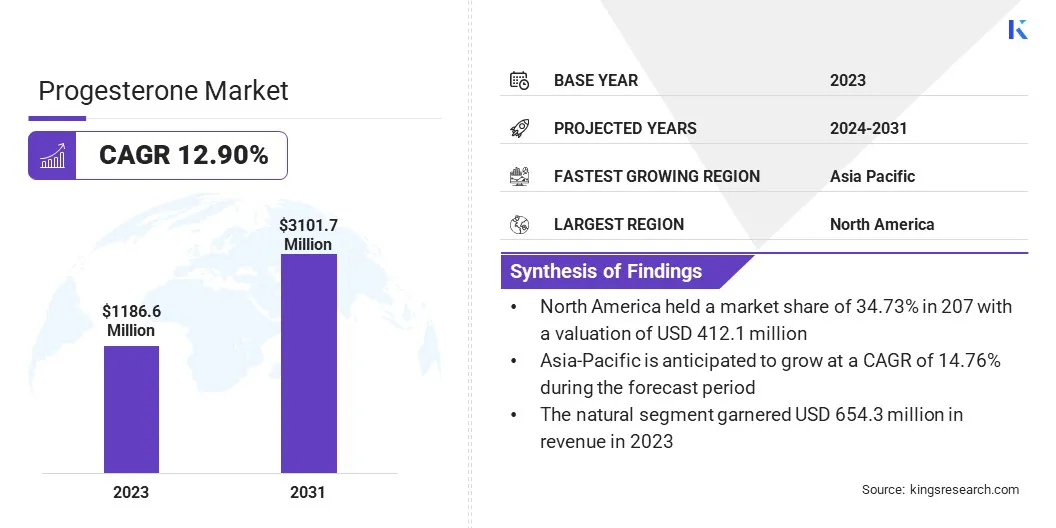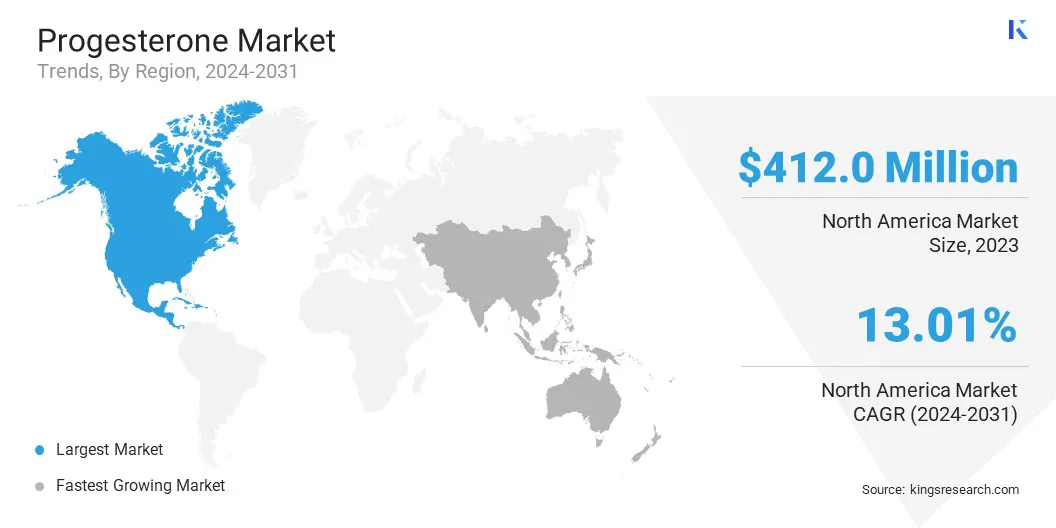Progesterone Market Size
The global Progesterone Market size was valued at USD 1,186.6 million in 2023 and is projected to grow from USD 1,326.3 million in 2024 to USD 3,101.7 million by 2031, exhibiting a CAGR of 12.90% during the forecast period. The market is expanding due to rising cases of hormonal disorders such as PCOS and menopause symptoms, along with increased utilization of assisted reproductive technologies such as IVF.
Innovations in bioidentical hormone treatments, recent FDA approvals for hormone therapies, and improved accessibility to healthcare services are key factors supporting market expansion. These factors collectively contribute to market growth, by addressing the increasing demand for effective treatments across a broad spectrum of reproductive and hormonal health issues.
In the scope of work, the report includes solutions offered by companies such as Alkem Labs, Biopharma, Blubellpharma, Cadila Pharmaceuticals, Cipla Limited, Estrellas Life Sciences Private Limited, Glenmark Pharmaceuticals, Lupin Limited, Virtus, Teva Pharmaceuticals USA, Inc., and others.
The progesterone market is experiencing robust growth, primarily driven by increasing incidences of hormonal disorders such as polycystic ovary syndrome (PCOS) and menopause-related symptoms, as well as rising demand for assisted reproductive technologies (ART), including in vitro fertilization (IVF).
Hormone replacement therapy, which accounted for the largest market share of 37.75% in 2023, plays a crucial role in managing these conditions. As awareness grows and healthcare providers prescribe progesterone therapies more frequently, the market is witnessing substantial growth. Innovations in bioidentical hormone formulations and recent FDA approvals for hormone replacement therapies further bolster market growth.
Progesterone is a vital hormone primarily produced by the ovaries following ovulation during the menstrual cycle. Its key role involves preparing the uterine lining for potential pregnancy and supporting early pregnancy stages. In addition to its major role in reproductive functions, progesterone influences various bodily processes and is essential for the development of secondary sexual characteristics.
In medical contexts, synthetic forms known as progestins are utilized in hormone replacement therapy and contraceptives to replicate progesterone's effects. Understanding and managing progesterone levels are critical in fertility treatments, the management of menstrual irregularities, and the treatment of hormonal imbalances, highlighting the hormone's significance in women's health and reproductive medicine.

Analyst’s Review
The rising incidence of breast cancer and recent FDA approvals are boosting substantial demand for hormone replacement therapies such as progesterone.
- For instance, Bijuve, which was approved as a hormone replacement therapy by NHS Scotland in September 2022, is specifically designed for women with estrogen deficiency postmenopause, a critical demographic affected by breast cancer.
- According to the World Health Organization, breast cancer caused 670,000 deaths globally in 2022, with approximately half of all cases occurring in women without specific risk factors other than their sex and age. With breast cancer being the most common cancer in women in 157 out of 185 countries in 2022, the development and availability of effective hormone therapies are critically important.
FDA approvals further validate the efficacy and safety of these treatments, fostering market expansion in response to the increased focus on women's health and hormone-related conditions in healthcare.
Key players in market are likely to prioritize the development of therapies for postmenopausal women, especially those at risk for breast cancer. Investing in clinical trials and seeking timely regulatory approvals are crucial. Additionally, collaborating with healthcare providers and organizations such as the NHS and WHO could help disseminate information and enhance patient education.
Progesterone Market Growth Factors
The rising incidence of hormonal disorders such as polycystic ovary syndrome (PCOS) and menopause-related symptoms is boosting the demand for progesterone treatments. PCOS leads to irregular menstrual cycles and infertility, whereas menopause is often associated with symptoms such as hot flashes and mood swings, both of which may be managed through progesterone therapy.
Increasing awareness about these conditions is prompting more women to seek medical intervention. As access to healthcare improves, medical professionals are increasingly recommending progesterone treatments. Concurrently, pharmaceutical companies are developing innovative formulations, which is significantly boosting the growth of the progesterone market.
- According to the WHO, polycystic ovary syndrome (PCOS) represents a major public health issue, affecting 8–13% of women of reproductive age, with up to 70% of cases remaining undiagnosed.
These numbers underscore the need for increased awareness and improved diagnostic measures, thereby surging the demand for treatments such as progesterone therapy.
However, the variability in patient response to hormone therapies is hindering the growth of the progesterone sector. This variability complicates the effectiveness of treatments and patient outcomes, necessitating personalized approaches that are both resource-intensive and challenging to implement uniformly across diverse patient populations.
Moreover, regulatory complexities and safety concerns, including the potential side effects associated with hormone therapies, are contributing to hesitancy among both healthcare providers and patients. However, key players are investing heavily in advanced hormone therapy formulations to improve treatment efficacy and minimize side effects.
Additionally, these companies are enhancing patient monitoring and support systems to address variability in patient responses. Regulatory compliance remains a priority, with firms ensuring adherence to evolving safety standards, thereby fostering trust among healthcare providers and patients.
Progesterone Market Trends
The growing adoption of bioidentical hormones is propelling the growth of the progesterone market. Bioidentical hormones, which are chemically identical to those naturally produced by the body, are increasingly favored over synthetic alternatives due to their perceived safety and efficacy benefits.
This preference is increasing the demand from patients for personalized and natural hormone replacement therapies (HRT) that align closely with their physiological needs. Moreover, healthcare providers are increasingly recommending bioidentical progesterone products, which is leading to their use among a broader patient base.
Pharmaceutical companies, recognizing this trend, are investing heavily in research and development to innovate new formulations and expand their bioidentical hormone product lines, thereby fueling market expansion. Advancements in assisted reproductive technology (ART), such as in vitro fertilization (IVF), are driving significant demand for progesterone. Progesterone is essential for preparing and maintaining the uterine lining, which is crucial for embryo implantation and the support of early pregnancy.
As the success rates of ART improve, there is a growing reliance on progesterone supplementation to enhance pregnancy outcomes. The pivotal role of progesterone in fertility treatments has led to increased demand. Healthcare providers are increasingly prescribing progesterone throughout various stages of assisted reproduction, highlighting its indispensable role in modern reproductive medicine. This trend is prompting ongoing advancements in progesterone formulations tailored for fertility applications.
Segmentation Analysis
The global market is segmented based on product, formula, application, and geography.
By Product
Based on product, the progesterone market is categorized into natural and synthetic. The natural segment garnered the highest revenue of USD 654.8 million in 2023. Key factors stimulating this growth include increasing incidences of diseases such as abnormal uterine bleeding, breast or uterine cancer, and other related health complications.
Moreovcer, there is a rising preference for natural progesterone due to its perceived safety and efficacy compared to synthetic alternatives. Pharmaceutical companies are actively innovating and expanding their product offerings in response to the growing demand for natural progesterone therapies.
By Formula
Based on formula, the market is divided into oral, injectable, topical, and others. The oral segment captured the largest progesterone market share of 41.67% in 2023. Oral progesterone formulations offer convenience and ease of administration compared to other delivery methods, making them appealing to both patients and healthcare providers.
This convenience enhances patient compliance and adherence to treatment, thereby supporting sustained demand. Additionally, advancements in oral progesterone formulations, such as extended-release tablets or capsules, improve treatment efficacy and patient outcomes, thus bolstering segmental expansion. Moreover, the oral segment benefits from extensive research and development efforts aimed at enhancing bioavailability and reducing side effects.
By Application
Based on application, the market is categorized into hormone replacement therapy, contraceptives, infertility treatment, and others. The hormone replacement therapy segment is expected to garner the highest revenue of USD 1,178.3 million by 2031.
Horomone replacement therapies (HRTs) address hormonal imbalances associated with menopause and other conditions, thereby enhancing the quality of life for many women. HRT formulations, including progesterone-based therapies, are increasingly preferred due to their effectiveness in managing symptoms such as hot flashes and mood swings.
Moreover, advancements in HRT formulations, such as bioidentical hormones and combination therapies, cater to diverse patient needs, thereby augmenting segmental expansion. Increased awareness of menopausal health and the expansion of healthcare access are boosting the demand for HRT.
Progesterone Market Regional Analysis
Based on region, the global market is classified into North America, Europe, Asia-Pacific, MEA, and Latin America.

North America progesterone market share stood around 34.73% in 2023 in the global market, with a valuation of USD 412.1 million. This notable growth is largely propelled by the increasing incidence of uterine body cancers in the region.
- According to projections by the American Cancer Society, approximately 65,950 new cases of cancer were anticipated for 2022, which led to a significant increase in the demand for progesterone therapies for cancer treatment and management. Additionally, the presence of sarcomas in about 10% of uterine body cancers contributes to market growth.
The regional market further benefits from increased awareness of cancer diagnoses and a well-developed healthcare infrastructure, which facilitates timely access to advanced treatments and supports the expansion of progesterone-based therapies tailored for cancer care.
Asia-Pacific is anticipated to witness significant growth at a staggering CAGR of 14.76% over the forecast period. The rising prevalence of hormonal disorders, such as polycystic ovary syndrome (PCOS) and menopause-related symptoms, is increasing the demand for progesterone therapies.
Additionally, the region's expanding middle-class population and improving healthcare infrastructure are enhancing access to healthcare services, including hormone therapies. Furthermore, increasing awareness regarding reproductive health and rising disposable incomes are fostering regional market expansion.
Competitive Landscape
The global progesterone market report will provide valuable insight with an emphasis on the fragmented nature of the industry. Prominent players are focusing on several key business strategies such as partnerships, mergers and acquisitions, product innovations, and joint ventures to expand their product portfolio and increase their market shares across different regions.
Companies are implementing impactful strategic initiatives, such as expanding services, investing in research and development (R&D), establishing new service delivery centers, and optimizing their service delivery processes, which are likely to create new opportunities for market growth.
List of Key Companies in Progesterone Market
- Alkem Labs
- Bionpharma
- Blubellpharma
- Cadila Pharmaceuticals
- Cipla Limited
- Estrellas Life Sciences Private Limited
- Glenmark Pharmaceuticals
- Lupin Limited
- Virtus
- Teva Pharmaceuticals USA, Inc.
Key Industry Development
- May 2023 (Product Approval): Astellas Pharma Inc.announced that the U.S. Food and Drug Administration (FDA) has approved VEOZAH (fezolinetant) 45 mg, a once-daily treatment for moderate to severe vasomotor symptoms (VMS) linked to menopause. This approval designates VEOZAH as the first nonhormonal neurokinin 3 (NK3) receptor antagonist to be approved for managing menopause-related VMS.
The global progesterone market is segmented as:
By Product
By Formulation
- Oral
- Injectable
- Topical
- Others
By Application
- Hormone Replacement Therapy
- Contraceptives
- Infertility Treatment
- Others
By End-User
- Hospitals
- Clinics
- Ambulatory Surgical Centers
- Others
By Region
- North America
- Europe
- France
- U.K.
- Spain
- Germany
- Italy
- Russia
- Rest of Europe
- Asia-Pacific
- China
- Japan
- India
- South Korea
- Rest of Asia-Pacific
- Middle East & Africa
- GCC
- North Africa
- South Africa
- Rest of Middle East & Africa
- Latin America
- Brazil
- Argentina
- Rest of Latin America


